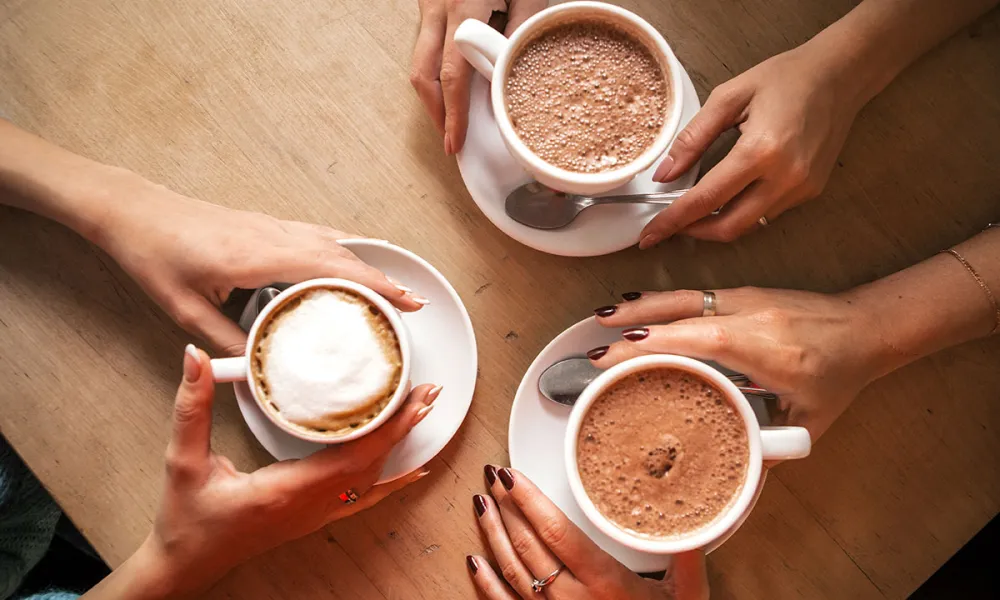News
Sweetened and unsweetened coffee consumption associated with lower death risk, new study suggests

A cohort study has found that compared to non-coffee drinkers, adults who drank moderate amounts (1.5 to 3.5 cups per day) of unsweetened coffee or coffee sweetened with sugar were about 30% less likely to die from any cause during a 7-year follow-up period.
More than 171,000 participants from the U.K. without known heart disease or cancer were asked several dietary and health behavior questions to determine coffee consumption habits.
The authors found that during the 7-year follow up period, participants who drank any amount of unsweetened coffee were 16 to 21% less likely to die than participants who did not drink coffee. They also found that participants who drank 1.5 to 3.5 daily cups of coffee sweetened with sugar were 29 to 31% less likely to die than participants who did not drink coffee.
Results were unclear for people who used artificial sweeteners in their coffee, reported Dr. Chen Mao, of Southern Medical University in Guangzhou, China, and co-authors in Annals of Internal Medicine.
“Drinking coffee was associated with a lower risk of dying whether or not you added sugar,” said Dr. Christina Wee, deputy editor of Annals of Internal Medicine, who drinks coffee with cream and sugar regularly and enjoys it.
“The authors defined moderate levels of coffee drinking as drinking one and a half to three and a half cups of coffee,” she noted. “They found that drinking moderate levels of coffee regularly was associated with a lower risk of dying from any cause, dying from cancer, and dying from heart disease.”
“The lower risk of dying associated with moderate levels of coffee drinking was true regardless of whether you drank decaffeinated coffee, instant coffee or ground coffee,” Wee added.
Previous studies observing the health effects of coffee have found that coffee consumption is associated with a lower risk of death but did not distinguish between unsweetened coffee and coffee consumed with sugar or artificial sweeteners.
The authors add that the participant data is at least 10 years old and collected from a country where tea is a similarly popular beverage.
They caution that the average amount of daily sugar per cup of coffee recorded in this analysis is much lower than specialty drinks at popular coffee chain restaurants, and many coffee consumers may drink it in place of other beverages that make comparisons to non-drinkers more difficult.
Terry A. Hurlbut has been a student of politics, philosophy, and science for more than 35 years. He is a graduate of Yale College and has served as a physician-level laboratory administrator in a 250-bed community hospital. He also is a serious student of the Bible, is conversant in its two primary original languages, and has followed the creation-science movement closely since 1993.
-

 Civilization3 days ago
Civilization3 days agoWhy Europe Shouldn’t Be Upset at Trump’s Venezuelan Actions
-

 Executive4 days ago
Executive4 days agoHow Relaxed COVID-Era Rules Fueled Minnesota’s Biggest Scam
-

 Constitution5 days ago
Constitution5 days agoTrump, Canada, and the Constitutional Problem Beneath the Bridge
-

 Christianity Today3 days ago
Christianity Today3 days agoSurprising Revival: Gen Z Men & Highly Educated Lead Return to Religion
-

 Civilization4 days ago
Civilization4 days agoThe End of Purple States and Competitive Districts
-

 Executive3 days ago
Executive3 days agoWaste of the Day: Can You Hear Me Now?
-

 Executive4 days ago
Executive4 days agoWaste of the Day: States Spent Welfare in “Crazy Ways”
-

 Guest Columns5 days ago
Guest Columns5 days agoWhy We Need Lent


